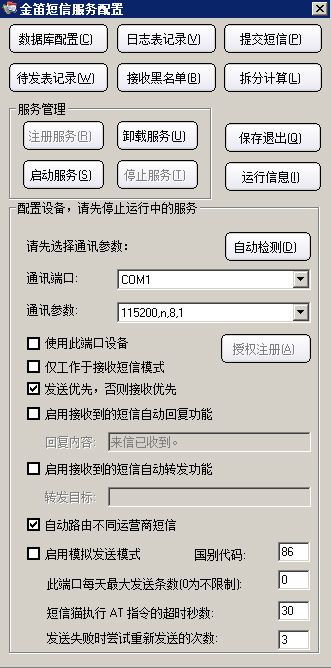Brief instructions:
1)This middleware opens four shared database tables to the customer: T_SendTask, T_SentRecord, T_RecRecord and T_EventLog;
2)If the customer wants to send SMS, he just needs to write target phone numbers, content, sending priority and scheduled time into the SendTask Table;
3)This middleware can automatically check the SendTask Table according to the scheduled time and then send them out. Besides, for each sending target and divided messages, it generates the logs of sending results and writes into the SentRecord Table, so that the system of user can query the final sending state.
4)This middleware can receive replied messages automatically and write into the RecRecord Table, then the user can deal with them at scheduled time.
5)This middleware write the generated logs into the EventLog Table and the system of user can get the running state according to the logs at any time.
Technical Features
· The development is based on C and C++ language, and it runs efficiently in the operating systems of WINDOWS NT series;
· Connected by ODBC and support variety main popular databases such as SQL SERVER, ORACLE, DB2, MySQL, PostgreSQL, Access and so on. Also support other databases according to the requirements of users;
· Provide more than one interface, including database interface and COM components interface (support multiple events), so that the enterprise can extend SMS function in other business systems;
· Support bulk SMS of multiple target numbers and automatically divide super long text to send, and transfer or reply received messages automatically;
· Provide the running way in back-end system service of windows, and the device can start SMS automatically after reboot without manual operation;
· Based on database interface, the users system, the database server and the server of Jindi SMS can be deployed individually to avoid influencing each other;
· Based on database interface, no matter whether it is C++ or JAVA, .NET or J2EE, they all can be integrated perfectly;
· Support at most 128pcs modems in parallel at the same time and do load balancing automatically when sending SMS in big batches;
· Support SMS queue, priority and signature. Common SMS and WAP PUSH are allowed;
· Send SMS by the modem. The sensitive information (such as the storage, meetings/activities notices, phone numbers of customers/email addresses and so on) neednt be passed to any third party (like SP service providers) to send out, and no internet is connected, either. Then make sure the best security of the business data and the enterprise network.


